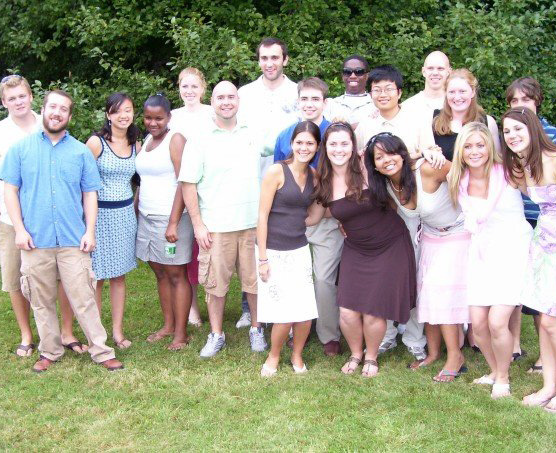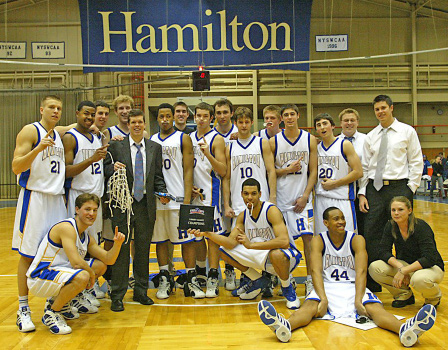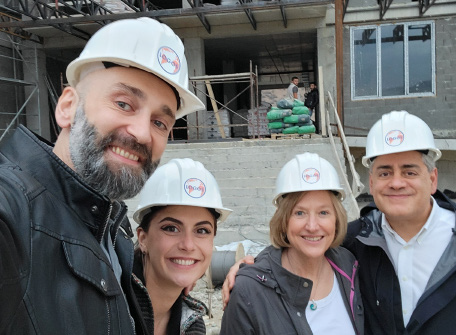
*The authors would like to thank Nicolai Tolstoy ’25 for valuable suggestions that significantly improved this article.
In 2004, an international student from the Republic of Georgia, a state that didn’t even exist just thirteen years earlier, enrolled at Hamilton College. Three and a half years later, that student completed a Senior Project in the Government Department that investigated the relationship between a country’s educational system and its prospects for democracy. His experience writing his thesis provided him with an inspiration that would determine his future life trajectory. The ensuing story is a testament to the ability of a Hamilton education to enable a student to make a positive difference in the world.
That student’s name is Giorgi Chavleishvili, and this past Nov. we traveled to Tbilisi, the capital of Georgia, to evaluate a study abroad program for Hamilton’s Office of Global Learning. While there we took advantage of the opportunity to check in on Giorgi and see for ourselves what had become of him. But first some background on this remarkable young man.
Giorgi’s story begins (at least in our telling) when he was just twelve years old. Today he stands a towering 6’5”, but what is amazing is the following. “I was my current height,” he told us, “At twelve years old and then I stopped growing!” Being a smart kid, Giorgi wisely decided to take up basketball. His excellence at the sport soon provided him with the opportunity to travel the world. His first stop was Fishburn Academy, a high school located in a small town in Virginia, where he enrolled as a sophomore in 2001. He was then recruited to play for a different high school — St. Anne Bellfield, also in Virginia — which he helped to win its first ever championship.

Giorgi’s next stop was Clinton, NY, where he entered Hamilton as both a basketball recruit and an Opportunity Programs (OP)student. Giorgi remains grateful to both that program and Hamilton for their support. He believes that without the generous financial aid he was offered, he would not have been able to attend the college. As he told us, “My mother was making $300 per month at the time.” Moreover, Phyllis Breland, the Director of Opportunity Programs during Giorgi’s time at Hamilton, recalls that he “really appreciated the structure of OP, creation of community and appreciation for the ethnic riches.” In addition, she adds that he “was so positively impacted with the OP model, that he utilized portions of it for his school.” In addition to playing basketball, Giorgi also worked as an RA for three years and for Audiovisual Services for all four years of his time at Hamilton.
Fast forward to the spring of 2008 when Giorgi selected Professor Sharon Rivera’s section of the Government 550: Senior Project seminar, which is dedicated to assisting Government and World Politics majors complete their required senior projects. That course was where Giorgi laid the groundwork and sketched out his plans for his future life’s work. Sharon recalls that Giorgi expressed a desire to build on his research from the previous summer by further investigating educational reform in his native Georgia. He clearly had a passion for the liberal arts model of education — and both of the authors of this article are of the opinion that students should write their senior theses on subjects about which they are passionate. Although Giorgi’s subject was promising and policy-relevant, Sharon insisted that his thesis had to relate more directly to comparative politics since that was the topic of the seminar. Giorgi fervently desired for his country to become a consolidated liberal democracy, so he ultimately settled on an exploration of attitudes that Georgia’s traditional Soviet-era educational system lacked — such as tolerance and open mindedness — but that were required for democracy to fully take root in his home country.
Giorgi’s experience writing his thesis inspired him, and already then he was formulating plans to go back to Georgia and set up a school modeled on the liberal arts tradition. Right after graduation, in fact, Giorgi returned to his native country and immediately set about making his dream a reality. One of his first steps was to enlist the assistance of his mother, who had previously worked as a pediatrician and had since transitioned to a job in the Children’s Assistance Section, a governmental agency devoted to protecting children’s rights. Sharing his dream, Giorgi’s mother quit her job in order to work with her son full-time on launching the school.
Fast forward again, this time to 2024, and, after years of putting blood, sweat and tears into it, the school that Giorgi founded — Logos International Academy — has grown from just 22 students in 2010 into an educational complex that enrolls 510 students from pre-K through grade 12 today. According to its mission statement, one of the Academy’s main goals is to prepare Georgian high school students “to continue their studies in the leading universities of Georgia and the world” — just as its founder did. Giorgi reports that 100 percent of Logos’s graduates go on to college and 60 percent go abroad to study. Indeed, the Logos website states that “380 students [have] graduated from the school, 212 of them enrolled in various prestigious universities of the world.” Three of those students, in fact, have attended Hamilton! Anticipating our question about a potential brain drain inherent in this educational model, Giorgi remarked that almost all of Logos’s students come back to Georgia after graduation.
During a long conversation in his office, we also learned many more things about Logos. For instance, the school currently employs 170 teachers and staff, which affords them a student-to-teacher ratio of 4:1 and small classes that are capped at sixteen students. Tuition is one-third to one-sixth the price of comparable private schools in Georgia. By keeping tuition low, Logos aims to demonstrate that even Georgians of modest means can attend college abroad. Moreover, Giorgi’s overarching goal is to prepare students with practical skills that will enable them to handle everything they will encounter at a Western university — not just in the academic realm but also in regard to social life. The school’s focus on college prep was immediately evident to us on our visit: during our tour of the school, we happened to come across a one-on-one session at which a guidance counselor was helping a student identify colleges that might be a good fit.
Also evident to us was that Giorgi and his team at Logos bring an enthusiastic attitude and cosmopolitan spirit to their students every day. Given how much Georgians both want to be a part of Europe and adore the United States (in this regard, EU, American and NATO flags can be found in most of Tbilisi’s ubiquitous street graffiti), these traits undoubtedly represent some of the keys to the school’s success.
Giorgi has drawn on his experience in the United States in more ways than one. We asked him about the school’s recycling collection area that we had noticed. He replied, “Recycling is not common in Georgia, but Logos is trying to instill the practice. Every few weeks the staff brings these recycling bins to the factory.”
Since its founding a decade and a half ago, Logos has been renting space for its classrooms, libraries and recreation areas. One of Giorgi’s great sources of pride is the construction of a new building that will be ready to house the school this coming fall. He took us on a tour of the building, which is located in a less populated portion of the city and thus will provide the students with much more open space. (And, yes, more than a little of this space will be filled with basketball courts!)
Upon returning to the Hill from our travels in Georgia, we are more convinced than ever that Continentals can make the world a better place. Sometimes they even do so on the other side of the world.

















